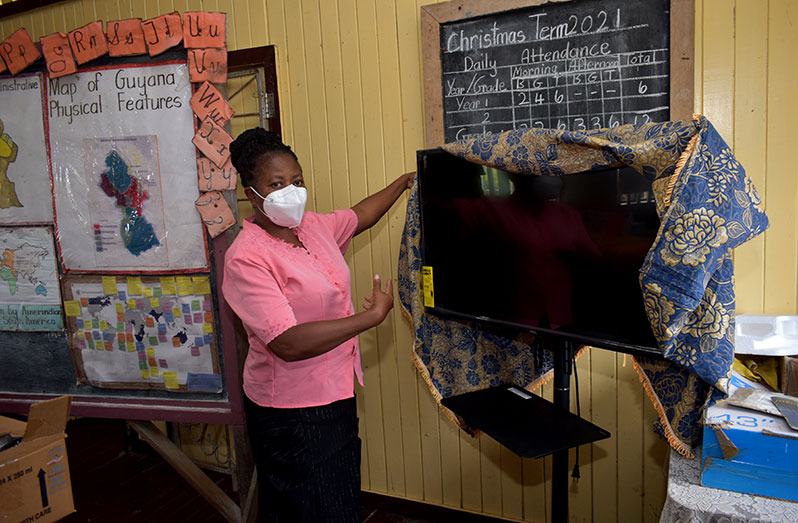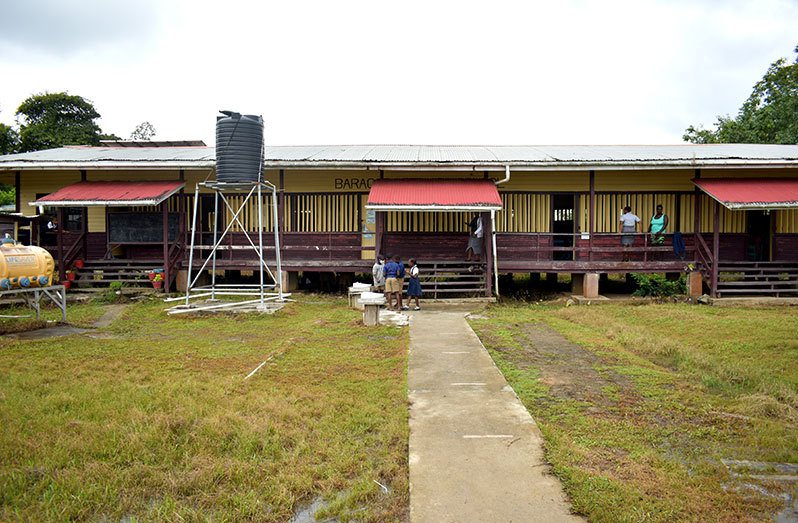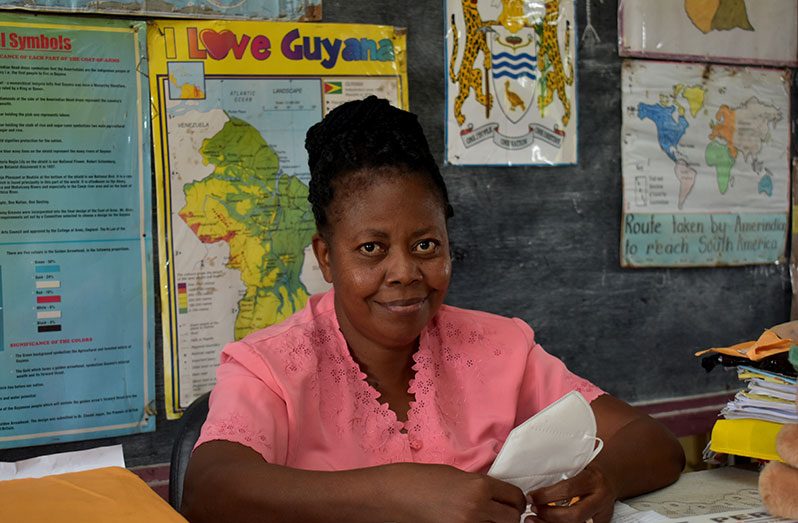WHEN Walterine Amsterdam started in the teaching profession 37 years ago, there was nothing like WiFi or a smart TV to aid her work; everything was ‘chalk and talk.’ Today, though, she cannot wait for the school building to be equipped with WiFi to better assist the 72 children who attend the school.
Amsterdam, the acting headmistress, came to Baracara Primary School from New Amsterdam in 1995 after getting married to Mortimer Amsterdam, a resident of Baracara. Over the years, she’s seen many positive changes and development at the school, many of which she’s very grateful for.
One in particular, she mentioned, was how the use of technology has been making her work easier. “You can have a nice little video to introduce your lesson,” she pointed out, after having just dismissed her class for break.

“Your lesson is totally different; generally far better. Everything is not just about making a teaching aid; you can share things with the children. You have nice games you can play with them. The children are more into it than this chalk and talk of long ago,” she shared.
The education authorities have also been very helpful in supplying whatever is needed to make life easier at the school. They’ve not been short, for instance, on providing literacy kids and worksheets. They’ve also presented the school with a smart TV, although they must first have the solar panels fixed to generate electricity so that it can be used.
The school, with pupils from Baracara, Ikuruwa, Torani, and Airy Hall – communities along the Canje River – has also received computer donations so that a lab is underway. Better internet and electricity have both been promised, Amsterdam noted. “The WiFi was repaired on the community building, but I am hoping they will put one on the school. In some of the classrooms, the children can pick it up on their tablets,” she noted.

The four other teachers at the school would also benefit greatly from better WiFi since they are studying online at the Cyril Potter College of Education. They’d have to leave the school and go to another location along the Canje River to be able to log in for classes after school. However, if they have a presentation during morning hours, they would have to leave and ask another teacher to hold their class.
“Sometimes they bounce on and off,” Amsterdam laughed, adding, “Sometimes they’re hearing but the trainers are not hearing them. They had to do demonstration lessons one time and they had a whole set of problems.”
Another challenge of the teachers has to do with having to conduct multi-grade teaching. “In each class, you have children who learn at different levels, so when you are multi-grading Grades One and Two using the new curriculum (we’re a pilot school for the new one)…it’s difficult. You have to know how to put it together to benefit both groups of children. So you have to get a smart mind to know how to. The teachers here are trying their best.”

If any teacher needs help, they wouldn’t hesitate to seek it from Amsterdam. If they know that they cannot handle a certain topic, they’d ask a colleague to fill in for them. “They would ask someone to hold their class while they do that part with the children. That’s how we work here.”
With Amsterdam planning to retire this year, she is doing all she can to help the younger teachers. “I want to set the platform so they can push on. I am trying to familiarise them with the job so that when I am gone, they can function by themselves because people don’t leave the road to come here to teach unless someone gets married to someone in here.”
Unique Classroom Experiences
Amsterdam can never forget the time when she opened her classroom door and heard something drop to the ground. Upon turning around, she saw a long snake that had apparently been resting on the ledge.

“I have snake guts so it couldn’t bite me,” Amsterdam, unafraid of snakes, mentioned. “Yesterday, one was in the children’s toilet. The cleaner went in and saw it. We’re not sure when it got in there because it was in the morning when the children had already started using the facility.”
At times, Amsterdam would be in the middle of teaching when all she’d see was something moving in the roof. “I will call the boat captain, and they’ll come and throw gasoline; it will fall down, and then we’ll kill it.” Even though the children are usually happy for the experience, they’ll run and scream and create a hullaballoo when the snake falls to the ground.
Dedicated to Nation-Building
In Baracara, education is not on the front burner in many homes because residents depend mainly on farming and logging. So the teachers have the extra task of helping parents to see the importance of making schoolwork a priority.
“Some of the children know that they can go and saw and sell the lumber and get money and plant the farm and get money, so you won’t find them eager to learn. They’ll come to school, but their interest is not there,” Amsterdam shared.
But the teachers continue to work with them and their parents in this regard. “We do parent conferencing to try to explain. For PTA, we will show them the actual schoolwork so that they can be able to help the children at home.”
To make a difference in children’s lives, Amsterdam believes that being a dedicated teacher is of utmost importance. “You have to be dedicated to the task of nation-building. If you’re not dedicated, then you’re just working for the money. You have to have this love within you for children. The influence of a good teacher can never be erased.”
Meanwhile, over the years, the school has had five other head teachers, namely, Peter Jaganand, Jessie Reynolds, Isaac Moore, Loraine Samuels, and Kim Sampson.




.jpg)










